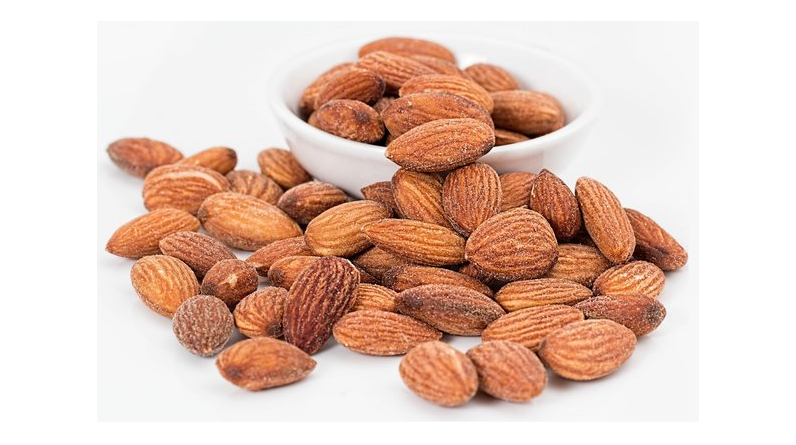Eat them raw in salads, grind them into nut butter, or use them in granola bars. Almonds are more than just a tasty source of satisfying crunch; they are a staple in many diets and often serve as the foundation for entire meals. Almonds are high in dietary fibre, protein, healthy fats, magnesium, and vitamin E, as well as many other nutrients, says the USDA.
Almonds are a surprising source of protein and fibre despite being classified as a “healthy fat.” The ninety-five percent of Americans who don’t consume the recommended amount of fibre can rejoice, as can vegans and vegetarians looking for plant-based protein sources. The article in question appeared in the American Journal of Lifestyle Medicine.
Almonds come in two main flavours, sweet or bitter, and there are dozens of varieties. The way they are cooked and seasoned may have a greater impact on their nutritional value. Salted and flavoured almonds are common in grocery stores, but raw, unsalted almonds are the healthiest option because they don’t contain any added sugars or salts.
The health benefits of almonds may be reaped in a variety of forms, from almond milk to almond flour. You can do the same by sticking to the basics the next time hunger strikes and eating a handful of raw almonds. Here are seven advantages you may enjoy.
1. High in protein and fibre, almonds are great for your muscles and your heart.

You may have heard that raw almonds make a healthy snack, and it’s true that they pack a hefty nutritional punch. Almonds have a lot of protein and fibre, so they’ll keep you full in between meals. The USDA reports that an ounce of almonds has a little more than 6 grammes (g) of protein and about 4 g of fibre (USDA).
Muscle development and maintenance depend on proteins because they are a fundamental component of the body. The Cleveland Clinic recommends allocating up to 35% of your daily calories to protein, with nuts and nut butters being good examples of this. Protein is also beneficial for weight loss or maintaining a healthy weight because this macronutrient (the other two being carbohydrates and fat) helps you stay full.
Almonds are a great source of protein, but we shouldn’t overlook the fibre they contain either. Most adults in the United States only consume about half of the daily recommended amount of fibre (CDC). It’s common knowledge that getting enough fibre is crucial for maintaining a healthy heart and digestive system. A meta-analysis published in the Journal of Chiropractic Medicine in December 2017 found that high-fiber diets significantly reduced the risk of cardiovascular disease. The Centers for Disease Control and Prevention (CDC) notes that fibre can help with weight loss, blood sugar control, and lowering colon cancer risk. In order to help men and women achieve their daily goals of 38 and 25 grammes (g) of fibre, respectively, the Academy of Nutrition and Dietetics recommends eating almonds as a naturally high-fiber food.
2. Almonds, which are rich in monounsaturated fat, are beneficial because they increase HDL cholesterol.

Almonds are renowned for their high concentration of healthy fats, but they also contain a lot of beneficial complex carbohydrates, fibre, and protein. Nutritionist Jenna Volpe of Austin, TX notes that they are particularly high in healthy monounsaturated fats. According to MedlinePlus, nuts are a good source of monounsaturated fats, a type of healthy fat that is associated with improved heart health.
According to Volpe, the monounsaturated fats in almonds increase levels of HDL cholesterol. According to a study published in the August 2017 issue of the Journal of Nutrition, “incorporating monounsaturated fatty acid-rich almonds in the diet or regularly replacing a refined-carbohydrate-rich snack with almonds may be enough to raise levels of high-density lipoprotein (HDL) cholesterol.”
Even if you don’t have heart problems, you should still eat plenty of healthy fats. According to the American Heart Association, healthy fats are crucial for maintaining proper cell function and adequate energy levels (AHA). However, since fat is high in calories, eating too much of it may cause one to gain weight. The Academy of Nutrition and Dietetics recommends getting 20-35% of your daily calories from healthy fats if you want to keep the weight off.
3. Vitamin E and other antioxidants found in abundance in almonds protect cells from oxidative stress.
Vitamin E is the antioxidant that Volpe would most like to see more people taking advantage of. She also mentions almonds as a great food source. Based on data from the United States Department of Agriculture (USDA), Volpe notes, “it is very easy for almond lovers to meet their daily vitamin E quota” by eating just one ounce of almonds.
Also Read :Here Are Five Things to Think About Before Buying New Office Gear
Vitamin E and other antioxidants protect cells from oxidative damage caused by free radicals. According to the Harvard T.H. Chan School of Public Health, vitamin E protects cells from free radical damage, boosts the immune system, and stops blood from clotting in the arteries.
Regular consumption of almonds has been shown in multiple studies to increase vitamin E levels in the blood, which may improve immunity and decrease inflammation, as suggested by Volpe. This theory is supported by research, such as a study published in the September 2018 issue of the European Journal of Nutrition. Almonds are highly recommended by Volpe as a source of vitamin E because they are readily absorbed by the body.
4. Eating almonds is associated with reduced levels of “bad” cholesterol.
The Center for Disease Control and Prevention reports that approximately 80% of adult Americans have high cholesterol, which raises the danger of cardiovascular disease and stroke. Almonds are your friends if you need to lower your cholesterol, which is why regular cholesterol checks are so important.
Stacey Simon, RDN, of Top Nutrition Coaching in Pleasantville, New York, claims that almonds can help reduce cholesterol and the likelihood of heart disease. They are rich in monounsaturated fatty acids, which help reduce levels of LDL cholesterol. The “good” cholesterol known as HDL can also be raised by eating almonds.
Simon cites a review published in Advances in Nutrition in November 2019 as evidence that eating almonds reduces the risk of heart disease. The review found that almond consumption decreased LDL cholesterol, increased HDL cholesterol, and decreased body weight. The Mayo Clinic recommends eating almonds as a snack or including them in salads as a means of lowering cholesterol. In addition, the Mayo Clinic stresses the importance of avoiding trans and saturated fats.
5. One possible way almonds lower disease risk is through their anti-inflammatory properties.
Numerous studies have found a correlation between nut consumption and a lower risk of cardiovascular disease and type 2 diabetes; additional studies have found that almonds are associated with improved inflammatory biomarkers.
Inflammation is a problem that can go undetected for a while, but according to Simon, it’s important not to let it fester. Antioxidants like the vitamin E in almonds help reduce chronic inflammation, Simon says. Heart disease, cancer, Alzheimer’s disease, and diabetes are just some of the chronic diseases whose risks are thought to be raised by chronic inflammation. They help lower inflammation by decreasing oxidative stress in the body.








